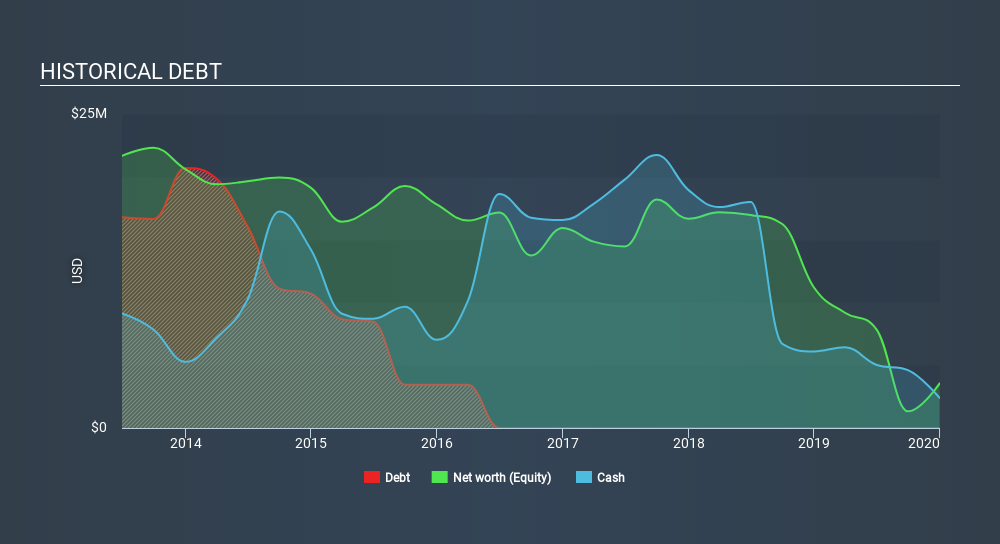- United States
- /
- Oil and Gas
- /
- NYSEAM:BRN
Here's Why Barnwell Industries (NYSEMKT:BRN) Must Use Its Cash Wisely

There's no doubt that money can be made by owning shares of unprofitable businesses. For example, although Amazon.com made losses for many years after listing, if you had bought and held the shares since 1999, you would have made a fortune. But while history lauds those rare successes, those that fail are often forgotten; who remembers Pets.com?
So should Barnwell Industries (NYSEMKT:BRN) shareholders be worried about its cash burn? In this report, we will consider the company's annual negative free cash flow, henceforth referring to it as the 'cash burn'. The first step is to compare its cash burn with its cash reserves, to give us its 'cash runway'.
Check out our latest analysis for Barnwell Industries
When Might Barnwell Industries Run Out Of Money?
A company's cash runway is calculated by dividing its cash hoard by its cash burn. When Barnwell Industries last reported its balance sheet in December 2019, it had zero debt and cash worth US$2.4m. Looking at the last year, the company burnt through US$5.4m. Therefore, from December 2019 it had roughly 5 months of cash runway. That's a very short cash runway which indicates an imminent need to douse the cash burn or find more funding. Depicted below, you can see how its cash holdings have changed over time.

How Well Is Barnwell Industries Growing?
Happily, Barnwell Industries is travelling in the right direction when it comes to its cash burn, which is down 66% over the last year. And there's no doubt that the inspiriting revenue growth of 73% assisted in that improvement. Considering these factors, we're fairly impressed by its growth trajectory. Of course, we've only taken a quick look at the stock's growth metrics, here. This graph of historic revenue growth shows how Barnwell Industries is building its business over time.
How Easily Can Barnwell Industries Raise Cash?
While Barnwell Industries seems to be in a fairly good position, it's still worth considering how easily it could raise more cash, even just to fuel faster growth. Generally speaking, a listed business can raise new cash through issuing shares or taking on debt. Commonly, a business will sell new shares in itself to raise cash to drive growth. We can compare a company's cash burn to its market capitalisation to get a sense for how many new shares a company would have to issue to fund one year's operations.
Barnwell Industries's cash burn of US$5.4m is about the same as its market capitalisation of US$5.6m. That suggests the company may have some funding difficulties, and we'd be very wary of the stock.
Is Barnwell Industries's Cash Burn A Worry?
On this analysis of Barnwell Industries's cash burn, we think its revenue growth was reassuring, while its cash burn relative to its market cap has us a bit worried. After looking at that range of measures, we think shareholders should be extremely attentive to how the company is using its cash, as the cash burn makes us uncomfortable. Separately, we looked at different risks affecting the company and spotted 4 warning signs for Barnwell Industries (of which 3 are concerning!) you should know about.
Of course, you might find a fantastic investment by looking elsewhere. So take a peek at this free list of interesting companies, and this list of stocks growth stocks (according to analyst forecasts)
Love or hate this article? Concerned about the content? Get in touch with us directly. Alternatively, email editorial-team@simplywallst.com.
This article by Simply Wall St is general in nature. It does not constitute a recommendation to buy or sell any stock, and does not take account of your objectives, or your financial situation. We aim to bring you long-term focused analysis driven by fundamental data. Note that our analysis may not factor in the latest price-sensitive company announcements or qualitative material. Simply Wall St has no position in any stocks mentioned. Thank you for reading.
About NYSEAM:BRN
Barnwell Industries
Acquires and develops crude oil and natural gas assets in Canada.
Slight and slightly overvalued.
Market Insights
Community Narratives





